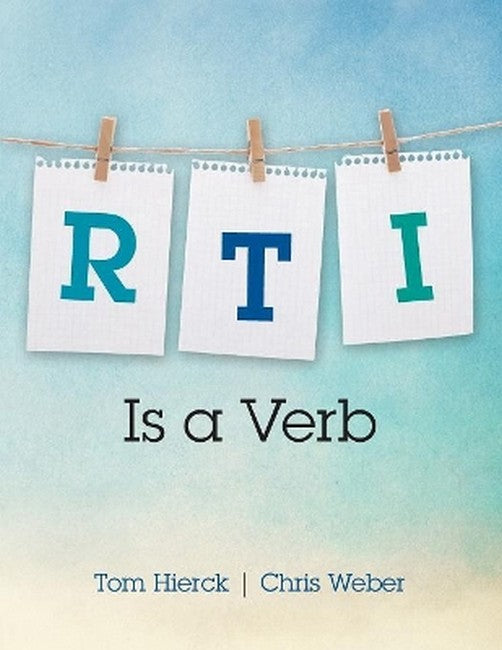Tom Hierck has been an educator since 1983 in a career that has spanned all grade levels and many roles in public education. His experiences as a teacher, an administrator, a district leader, a department of education project leader, and an executive director have provided a unique context for his education philosophy. Tom is a compelling presenter, infusing his message of hope with strategies culled from the real world. He understands that educators face unprecedented challenges and knows which strategies will best serve learning communities. Tom has presented to schools and districts across North America with a message of celebration for educators seeking to make a difference in the lives of students. His dynamic presentations explore the importance of positive learning environments and the role of assessment to improve student learning. His belief that "every student is a success story waiting to be told" has led him to work with teachers and administrators to create positive school cultures and build effective relationships that facilitate learning for all students. Tom Hierck's blog can be found at tomhierck.com/blog/. A native of Southern California, Chris Weber, EdD, has been in service to community and country his entire life. A graduate of the U.S. Air Force Academy, Chris flew C-141s during his military career. A former high school, middle school, and elementary school teacher and administrator, Chris has had a great deal of success helping students who historically underachieve learn at extraordinarily high levels. As a principal and assistant superintendent in California and Chicago, Illinois, Chris and his colleagues have developed systems of response to intervention (RTI) that have led to heretofore unrealized levels of learning at schools across the country. Chris is the best-selling author of Pyramid Response to Intervention: RtI, PLCs, and How to Respond When Students Don't Learn; Pyramid of Behavior Interventions: 7 Keys to a Positive Learning Environment; Simplifying Response to Intervention: Four Essential Guiding Principles; and RTI in the Early Grades: Intervention Strategies for Mathematics, Literacy, Behavior, and Fine-Motor Challenges. These books have sold more than one hundred thousand copies worldwide. In addition, Chris's article in Educational Leadership, "The Why Behind RTI," was the most viewed article on the publication's website in 2010. Chris is recognized as an expert in behavior, mathematics, and RTI. He consults and presents nationally to audiences on important educational topics, including Change and RTI-Preparing for Productive Teams; Behavioral RTI; Assessments for Tiers 2 and 3; If It's Predictable, It's Preventable-RTI in the Early Grades; Scheduling, Communication, and Coordination of RTI Schoolwide Teams; The What and Why of RTI; Evidence-Based Reading Strategies and Programs; and Common Core Mathematics-A Balanced Approach to Depth and Mastery. In addition to writing and consulting on educational topics, Chris continues to serve in schools, working with teachers and students every day in Chicago, Illinois, at some of the highest-performing urban schools in the nation.
Request Academic Copy
Please copy the ISBN for submitting review copy form
Description
About the Authors Acknowledgments Chapter 1. Introduction and the Research Chapter 2. Content and Instruction in Tier 1 Chapter 3. Common Formative Assessments, Evidence, Data Analysis, and Collaboration Chapter 4. Information Within RTI: Screening, Progress Monitoring, and Diagnoses Chapter 5. Tier 2 and 3 Interventions, Strategies, and Resources Chapter 6. Social and Academic Behavioral Interventions Chapter 7. Lead the Work With Confidence, Leadership, and Accountability Epilogue: The Next Steps References Index
"Requiring that all students graduate with the ability to enter college or a skilled career with the 21st Century Skills required to continue to learn further heightens the challenge...RTI, then, is about so much more than interventions. It defines what we are as a profession and philosophically underpins the reflective checkpoints we use to assess the extent to which all students are learning." -- From Chapter 1 "I have been incredibly impressed with RTI Is a Verb. The authors have skillfully shown how RTI, when done properly, is an opportunity to transform the school environment into one that maximizes the learning opportunities of all involved- staff, students, and community. A must read!" -- Greg Wolcott, Assistant Superintendent for Teaching and Learning "A breath of fresh air, RTI is a Verb offers an insightful, collaborative approach to RTI. In this comprehensive yet easy-to-read format, the authors reveal that RTI is in fact a VERB; and that in order to create the change that is required in today's schools, the very culture of the school itself must be transformed. The book offers a demonstration of how creating a culture of cooperation is imperative for the successful implementation of RTI: teachers working with teachers; teachers working with parents; and teachers working individually with students. The authors argue that 'cultures not structures' instill lasting reform; and through an interactive, thoughtful discussion on where we are now versus where we are headed, the authors construct a roadmap along with a set of directions on how it is we shall get there. The most appealing part of the book is that it is candid and forthright: it takes the worn-out use of the RTI acronym and breaks it down to a workable and applicable tool. The authors remind us that 'RTI is simply allowing for the time and support for students to be successful.' It means meeting students where they are and taking the time required to get them where they need to be. Sounds simple enough - but just because it's simple doesn't mean it's easy." -- Amy Mims, President "Historically, mandates have not provided solutions for school improvement. Instead, solutions have been found by schools collaborating to clearly define key content and effective instruction. Hierck & Weber share these solutions as they invite readers to engage in collaboration and establish a common language around RTI. Their collection of templates and samples are based on what works in real schools. Equipped with this text, school leaders are prepared to move from the theory of RTI to real gains in student achievement." -- Leeann Michalak Bartee, Principal

